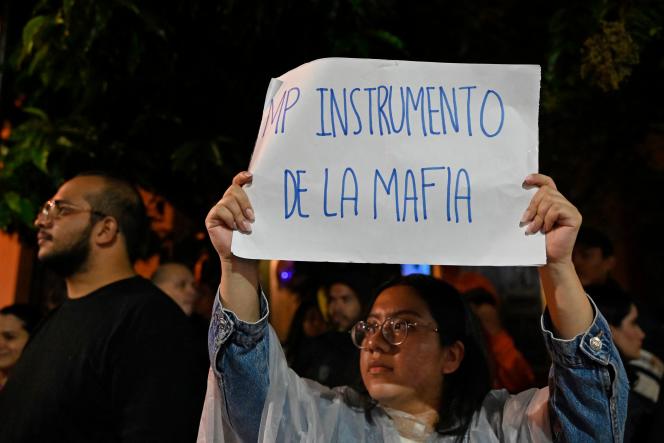Guatemalan justice sowed confusion on the evening of Wednesday July 12, one month before the second round of the presidential election: the Supreme Electoral Tribunal (TSE) validated the results of the first round while another court suspended the party of challenger.
The TSE proclaimed the qualification for the second round of Mr. Bernardo Arévalo, who created the surprise in the first round and of Mme Sandra Torres, after a verification of the votes required by the Constitutional Court at the request of the main losers.
Also on Wednesday evening, the head of the Special Prosecutor’s Office against Impunity (FECI), Rafael Curruchiche, announced on social media that the legal personality of Mr. Arévalo’s Semilla (seed) party had been suspended by a criminal court, which could prevent him from competing in the second round, scheduled for August 20.
Mr. Curruchiche, targeted by sanctions from Washington because of the lawsuits against anti-corruption judges, cited alleged irregularities in the collection of signatures necessary for the legalization of the political training.
Washington’s ‘deep concern’
In Washington, the head of American diplomacy for Latin America, Brian Nichols, immediately welcomed on Twitter the “confirmation of the will of the people” by the TSE, but also declared its “deep concern about new threats [qui pèsent] on Electoral Democracy in Guatemala ».
To everyone’s surprise, M.me Torres and Mr. Arévalo, both social democrats, found themselves at the head of the 22 presidential candidates in the first round, marked by high abstention and a large number of invalid ballots.
Favorite in the polls and unsuccessful candidate on several occasions, Sandra Torres, ex-wife of former left-wing president Alvaro Colom (2008-2012), obtained almost 16% of the vote.
MP Bernardo Arévalo, son of the country’s first democratically elected president, Juan José Arévalo (1945-1951), created a surprise, with almost 12% of the vote. He was placed in eighth position, with 2.9% of voting intentions, in the last pre-election poll by the Prodatos Institute.
against the law
The evictions even before the presidential election of three favorites, including a Mayan leader, had cast doubt on the fairness of the ballot and the impartiality of electoral and judicial institutions. They are accused by the opposition and human rights organizations of maneuvering to perpetuate a corrupt regime based on co-option by the oligarchy.
The election of a social democrat would constitute a break after three right-wing presidencies: Otto Perez (2012-2015), Jimmy Morales (2016-2020 and the outgoing president, Alejandro Giammattei.
The court’s decision against Mr. Arévalo’s party is already the target of criticism, as it contradicts Guatemalan law which stipulates that a “party cannot be suspended after calling an election”.
The World App
The Morning of the World
Every morning, find our selection of 20 articles not to be missed
Download the app
Guatemala is one of the most unequal countries in Latin America, judges the World Bank, with 10.3 million of its 17.6 million inhabitants living below the poverty line, and, according to the UN, one in two children suffers from chronic undernutrition.
